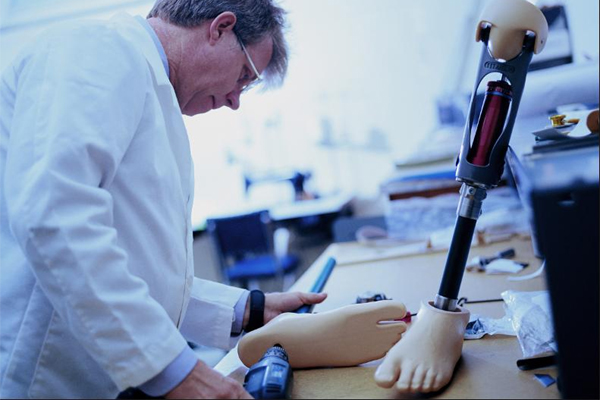



|
Tweet
Pin
It
|
The minimum educational requirement to become a prosthetist and orthotist is a four and half year degree in Prosthetics and Orthotics from a recognised university. After graduation, in order to practice as prosthetist and orthotist in India candidates must register with Rehabilitation Council of India.
For admission to four and a half year bachelors' degree course in prosthetics and orthotics the candidates must have cleared 10 + 2 with Physics, Chemistry, Maths and Biology. While candidates aspiring for a masters' degree in prosthetics and orthotics should have a bachelor's degree in prosthetics and orthotics.
Candidates with diploma qualifications are employed as technicians. The diploma courses are usually of two years duration. The eligibility requirement for a diploma course is that the candidates should have passed 10+2 with science subjects (Physics, Chemistry, Mathematics, Biology) or they should have a pass in 10+2 in the vocational stream in the trade of machinist or 10+2 and ITI certificate in the trade of Fitter/ Turner/ Machinist/ Tool or die maker. Candidates with a pass in the final diploma examinations conducted by the Board of Technical Education of the State Govt. in Mechanical/ Electrical/ or Electronics Engineering are also eligible.
For most of the courses the age criteria is that the candidate should have completed 17 years of age in the year of admission. The maximum age is usually 23 years however it may vary according to reservation stipulations as formulated by the government or according to the rules of individual institutions.
Selection:
The selection of candidates is made on the basis of merit. Those candidates who satisfy the eligibility criteria as regards age and educational qualifications are usually required to take an entrance test for the various courses. The tests usually consist of objective type questions based on subjects - Biology, Physics, Chemistry, Maths, English and GK. The questions are based on Senior Secondary School Certificate (10+2) curriculum.
Course Areas :
The course is both engineering and medical based. The syllabi includes classes in basic life sciences, basic engineering, prosthetics and orthotics workshop technology, orthopaedics, computer studies, physical medicine and rehabilitation, mobility aid, upper and lower limb prosthetics and orthotics, spinal orthotics. Besides theory classes, candidates are given extensive clinical practice and lab work so as to make them competent and well qualified in this field.
Internship: After successful completion of final year examinations, students have to undergo a six month internship which comprises of clinical practice, case presentation and fabrication of different kinds of orthoses and prostheses.
Personal Skills:
A candidate who intends to join this filed should have good communication, helping and caring skills. He/She should be sensitive and must have fair amount of patience and tolerance. Reliability, honesty and trustworthiness, enthusiasm, dedication and determination are some of the other qualities that a candidate must possess. The candidate should have aptitude for life sciences as well as engineering studies. Besides the candidate should be dexterous and alert.
Find it Useful ? Help Others by Sharing Online
Comments and Discussions |
Related
Career Options
|
|||
|
|